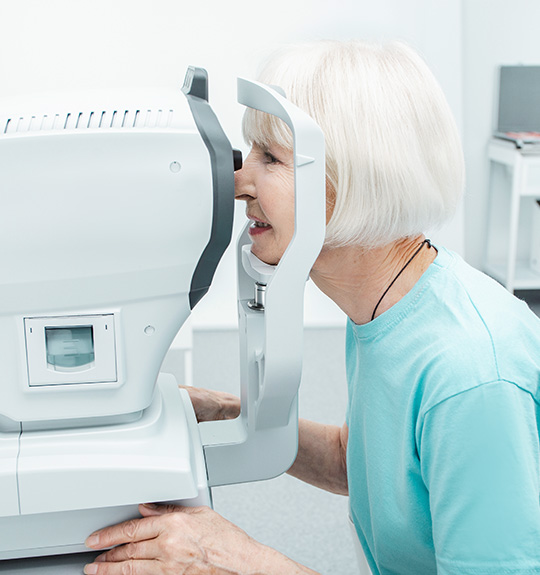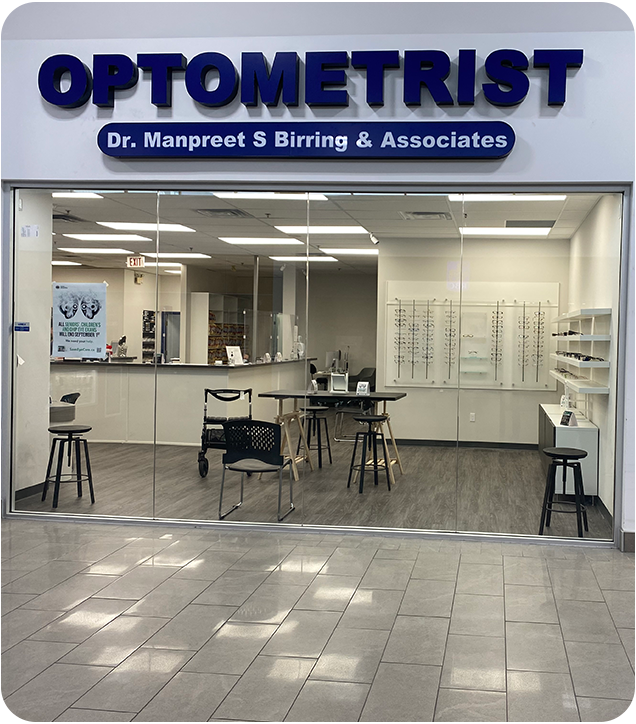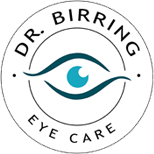Ocular Care Starts with an Eye Exam
Eye exams can tell us much more than your prescription. Did you know your eye doctor can detect health conditions that affect your whole body? We can see possible signs of diabetes, cancer, high cholesterol, multiple sclerosis, and much more!
Your optometrist can also help manage any eye diseases that may occur. Early detection is often the best way to manage eye disease and preserve your vision.
Your eyes aren’t an accessory; they’re an integral part of your body and a crucial part of overall health. Make sure they’re well cared for at Birring Eyecare.

Common Eye Problems
Glaucoma
Glaucoma is known as the “silent thief of sight” and is among the leading causes of blindness in Canada. There are many types of glaucoma, but the most common is caused by raised intraocular pressure. Visit our glaucoma page to learn more.
Conjunctivitis
Conjunctivitis, commonly known as pink eye, is inflammation of the conjunctiva (the clear tissue that covers the white part of the eye). It can be caused by viral or bacterial infection, allergies, or chemical irritation. Read more about conjunctivitis here.
Cataracts
Cataracts occur when the lens of the eye becomes clouded. Symptoms of cataracts include:
- Dull or muted colour vision
- Halos around lights
- Blurred or foggy vision
- The feeling of having a film over your vision that you can’t blink away
Almost everyone can develop cataracts as they age, often developing slowly with no pain or redness. Maintaining a healthy lifestyle (like proper nutrition and avoiding smoking, for example) and protecting your eyes from UV rays may help prevent cataracts.
Early vision problems caused by cataracts may be corrected by updating your glasses or contact lens prescription, but the main treatment is surgery, especially when the cataracts are advanced.
During the surgery, the cataract lens of the eye is removed and replaced with an artificial lens. All surgeries pose risks, but this procedure is safe for most people, and 9 out of 10 people report better vision post-surgery.
Age-Related Macular Degeneration
The macula is the part of the eye found at the very center of the retina, responsible for detailed central vision. Age-related macular degeneration (AMD) is a condition that occurs in the eye as we age, which leads to deterioration in central vision.
Much like glaucoma, age-related macular degeneration doesn’t usually present any early symptoms. As the condition progresses, you may notice blurry central vision. Other symptoms include less ability to recognize faces, straight lines appearing wavy, and dark spots.
There are 2 types of macular degeneration: dry and wet. Dry macular degeneration is more common. It may involve the slow accumulation of drusen—yellow deposits in the retina. Drusen aren’t the cause of AMD, but they do seem to be linked. Wet macular degeneration occurs when blood vessels under the macula leak into the retina, causing the macula to swell.
There is no cure for AMD, but treatments including medication, laser surgery, and low vision aides can help slow vision loss.

Diabetic Eye Diseases
Diabetes is a chronic disease that prevents the body from producing or using insulin properly, which leads to higher levels of sugar in the bloodstream.
The higher levels of sugar in the bloodstream can affect the blood vessels in the eye. This can lead to ocular problems, including changes in nearsightedness and farsightedness, glaucoma, cataracts, and blurred vision.
We can help detect both diabetes and diabetic damage during an eye exam. Fundus photography is used to capture clear images of the eye’s internal structures after dilating the pupil.
Diabetic Retinopathy
Diabetic retinopathy occurs when blood vessels in the retina grow weak due to the excess sugar in the bloodstream, causing them to swell and leak. New blood vessels can grow to replace the damaged ones. The damage, however, may leave you with dark spots and blurred vision.
The best way to prevent diabetic retinopathy is with a healthy lifestyle and keeping your diabetes well managed. As with most eye diseases, early detection is key. Visit us for an eye exam to get a clear picture of your retinal health.
Diabetic Macular Edema
Diabetic macular edema is a complication of diabetic retinopathy. It is caused by fluid from damaged blood vessels in the eye interfering with the macula’s function. Diabetic macular edema is the most common cause of vision loss in those with diabetic retinopathy.
Much like age-related macular edema, symptoms include central vision that appears blurred or wavy.
Make Sure You Have Regular Eye Exams
If you have diabetes, it’s crucial that you visit for regular eye exams, and keep up with your doctor’s care and management plan for your diabetes. We’re here as part of your healthcare team to keep your vision as clear as possible. Visit us to discuss your eye health today.
OCT for Eye Disease Diagnostics & Glaucoma Detection
Optical coherence tomography (OCT) is a noninvasive imaging system that allows our team to take pictures of the back of your eye, like the retina and optic nerve.
Our OCT of choice is the Topcon Maestro2. It combines OCT technology with fundus photography to give us even more information about your eyes and vision. These images and scans provide a detailed look at your eye, allowing us to build a personalized treatment plan. With OCT, our team is able to detect glaucoma up to 8 years before visual field loss.
The Topcon Maestro2 helps us monitor glaucoma using 3D widefield scans, and we can also detect macular edema, age-related macular degeneration (AMD), or issues with your optic nerve early.
Learn more about the importance of OCT in the early detection of glaucoma by checking out this published study.
Come & See Us
Find us in the Malton neighbourhood’s Westwood Square Shopping Centre, 10 minutes north of Pearson International Airport on Goreway Drive between Etude and Morning Star Drive, just off Highway 427 in Mississauga.

Our Address
- 56-7205 Goreway Drive
- Mississauga, ON L4T 2T9
Contact Information
- Phone: 905.677.9164
- Fax: 905.677.5044
- Email: [email protected]
Hours of Operation
- Monday: 11:00 AM – 6:00 PM
- Tuesday: 11:00 AM – 6:00 PM
- Wednesday: 11:00 AM – 6:00 PM
- Thursday: 11:00 AM – 6:00 PM
- Friday: 11:00 AM – 6:00 PM
- Saturday: 10:00 AM – 4:00 PM
- Sunday: Closed


